Daily Vocabulary Words: List of Daily Used Words in Leading International Newspapers
Hi there. Welcome to this special section @ Wordpandit.
Our endeavour here is very simple: to highlight important daily vocabulary words, which you would come across in leading newspapers in the country. We have included the following newspapers in our selection:
• The New York Times
• The Washington Post
• Scientific American
• BBC
• The Guardian
• Psychology Today
• Wall Street Journal
• The Economist
We are putting in extensive work for developing your vocabulary. All you have got to do is be regular with this section and check out this post on a daily basis. This is your repository of words that are commonly used and essentially, we are posting a list of daily used words. Hence, this has significant practical application as it teaches you words that are used commonly in leading publications mentioned above.
Visit the website daily to learn words from leading international newspapers.
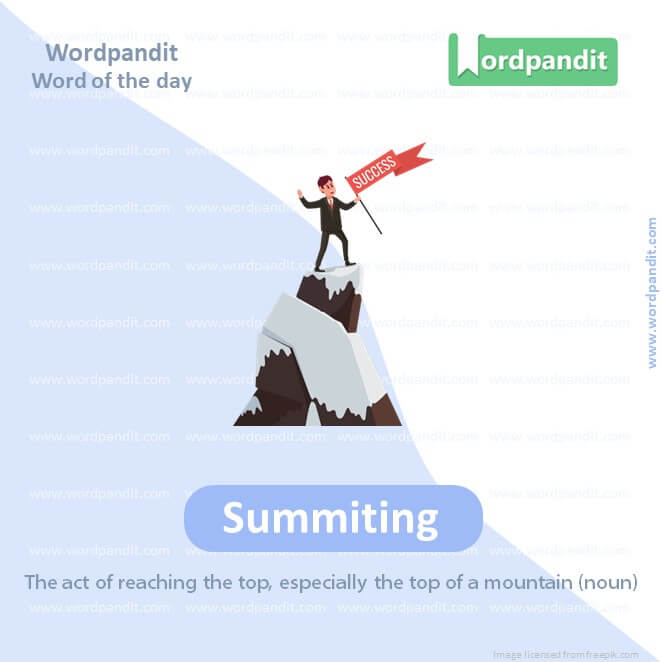
WORD-1: Summiting
CONTEXT: Teams reporting higher feelings of group belonging repeatedly outperform other teams because their members share more of their unique information about summiting Everest.
SOURCE: (Source not provided)
EXPLANATORY PARAGRAPH: Imagine you are walking up a very tall hill, and you finally reach the top. That’s what ‘summiting’ is! It’s like reaching the very top of a mountain or hill, where you can see everything around you. People do this to feel proud and happy that they climbed all the way up.
MEANING: The act of reaching the top, especially the top of a mountain (noun).
PRONUNCIATION: “SUM-it-ing”
SYNONYMS: Climbing, ascending, mountaineering, scaling, reaching the peak.
USAGE EXAMPLES:
1. She dreamed of summiting Mount Everest one day.
2. The team celebrated after summiting the challenging peak.
3. He trained for months before summiting the high mountain.
4. Summiting the hill gave them a breathtaking view of the valley.
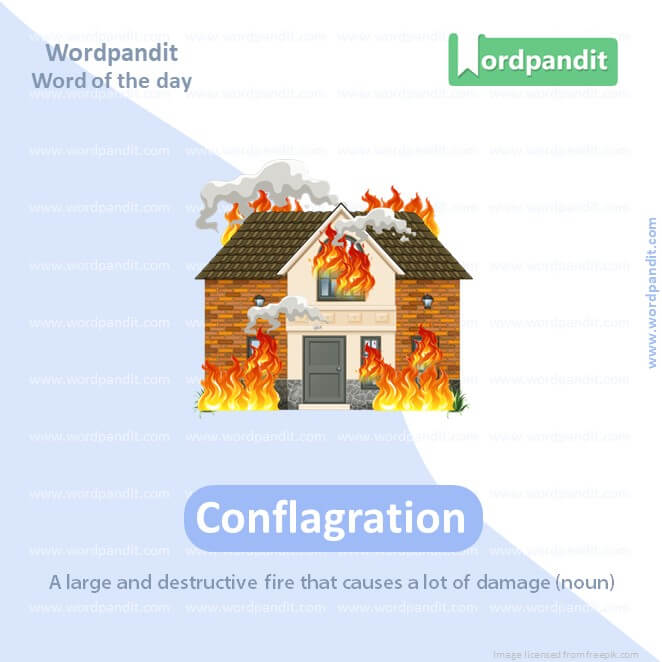
WORD-2: Conflagration
CONTEXT: the Houthis in Yemen this month, fears of a larger regional conflagration are steadily growing.
SOURCE: (Source not provided)
EXPLANATORY PARAGRAPH: Think of a very, very big fire, bigger than a campfire, that spreads and burns a lot of things. That’s called a ‘conflagration’. It’s so big that it can be scary and dangerous and needs to be put out quickly.
MEANING: A large and destructive fire that causes a lot of damage (noun).
PRONUNCIATION: “kon-fluh-GRAY-shun”
SYNONYMS: Blaze, inferno, firestorm, wildfire, holocaust.
USAGE EXAMPLES:
1. The conflagration spread quickly through the forest.
2. Firefighters worked hard to control the conflagration.
3. The conflagration destroyed many homes in the area.
4. They watched in horror as the conflagration engulfed the building.
WORD-3: Meticulously
CONTEXT: They have said as much publicly, and perhaps more important, they have meticulously avoided taking direct military action against either Israel or the United States.
SOURCE: (Source not provided)
EXPLANATORY PARAGRAPH: Doing something very carefully and paying attention to every little detail is being ‘meticulous’. It’s like coloring inside the lines very carefully, so you don’t make any mistakes.
MEANING: In a way that shows great attention to detail; very thoroughly and carefully (adverb).
PRONUNCIATION: “muh-TIK-yoo-lus-lee”
SYNONYMS: Carefully, precisely, thoroughly, diligently, attentively.
USAGE EXAMPLES:
1. She meticulously organized her toys by color.
2. He meticulously checked his work for errors.
3. The artist meticulously painted the tiny details.
4. She meticulously planned her birthday party.
WORD-4: Retaliating
CONTEXT: The groups they back are fighting Iran’s foes and so far, neither Israel nor the United States has signaled any interest in retaliating directly.
SOURCE: (Source not provided)
EXPLANATORY PARAGRAPH: ‘Retaliating’ is like getting back at someone for something they did to you. If someone takes your toy and you take theirs back, that’s retaliating. But remember, it’s always better to talk and solve problems!
MEANING: To do something bad to someone because they have done something bad to you (verb).
PRONUNCIATION: “rih-TAL-ee-ay-ting”
SYNONYMS: Avenging, revenging, getting back at, reciprocating, counterattacking.
USAGE EXAMPLES:
1. He thought about retaliating but decided it was better to forgive.
2. The country was preparing to retaliate for the attack.
3. She was angry and wanted to retaliate against her friend.
4. The team retaliated with a strong defense.
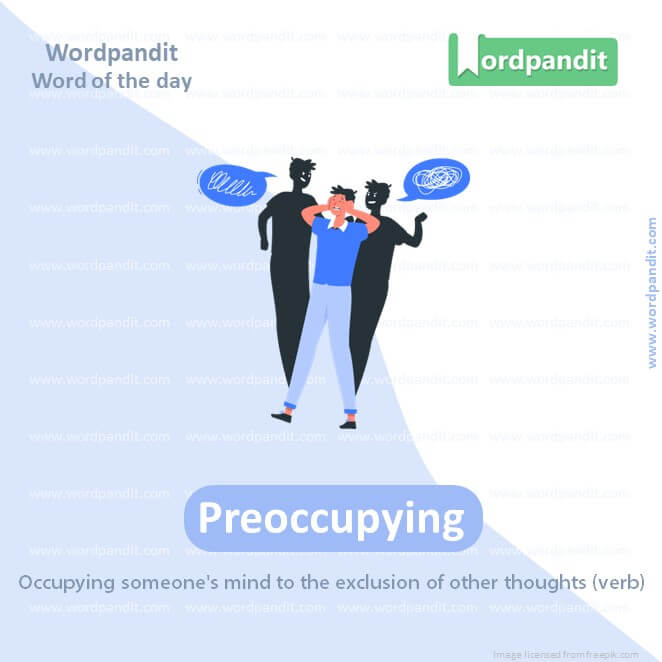
WORD-5: Preoccupying
CONTEXT: At the heart of Iran’s aversion to a major conflict are the domestic issues that have been preoccupying the regime.
SOURCE: (Source not provided)
EXPLANATORY PARAGRAPH: When you think a lot about something and can’t stop thinking about it, that’s ‘preoccupying’. It’s like when you’re so excited about your birthday party that you can’t think of anything else!
MEANING: Occupying someone’s mind to the exclusion of other thoughts (verb).
PRONUNCIATION: “pree-AHK-yoo-pie-ing”
SYNONYMS: Engrossing, absorbing, consuming, dominating thoughts, obsessing.
USAGE EXAMPLES:
1. The mystery of the lost toy was preoccupying her thoughts.
2. He was preoccupied with the upcoming football game.
3. Plans for the trip were preoccupying their conversations.
4. Her work was preoccupying all her free time.
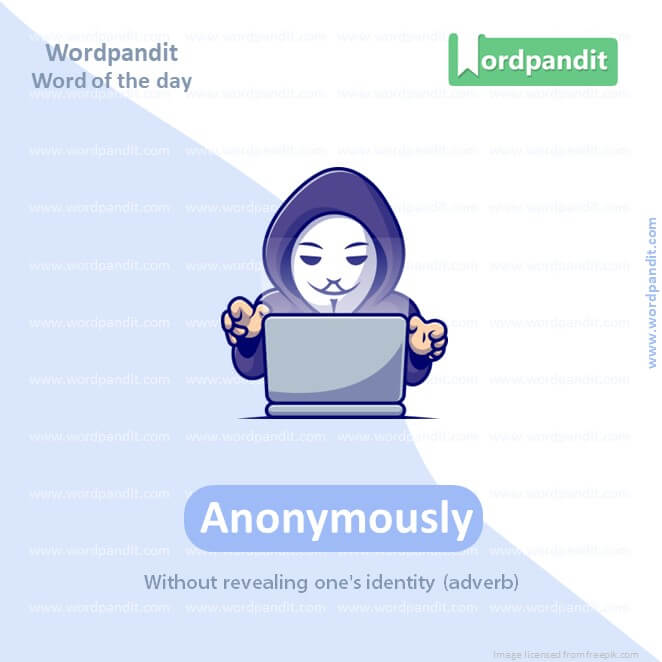
WORD-6: Anonymously
CONTEXT: This latest group of federal workers, however, organized a protest in their capacities as government officials yet did so anonymously to avoid being held responsible.
SOURCE: (Source not provided)
EXPLANATORY PARAGRAPH: Doing something ‘anonymously’ means doing it without letting anyone know it was you. Like leaving a secret gift for someone without a name tag, so they don’t know who it’s from.
MEANING: Without revealing one’s identity (adverb).
PRONUNCIATION: “uh-NON-ih-mus-lee”
SYNONYMS: Secretly, incognito, unnamed, without credit, unidentified.
USAGE EXAMPLES:
1. Someone anonymously left a present at the door.
2. The donation was made anonymously.
3. The letter was sent anonymously.
4. He wrote anonymously to the newspaper.
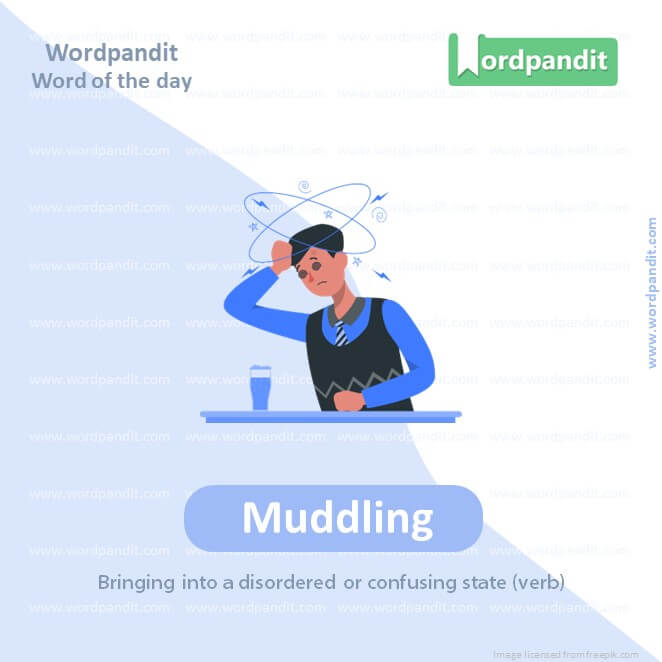
WORD-7: Muddling
CONTEXT: They were intentionally muddling that boundary.
SOURCE: (Source not provided)
EXPLANATORY PARAGRAPH: ‘Muddling’ is like mixing things up in a confusing way. Imagine if you put all your toys in a pile and can’t find your favorite one. That’s muddling them up.
MEANING: Bringing into a disordered or confusing state (verb).
PRONUNCIATION: “MUH-dl-ing”
SYNONYMS: Confusing, mixing up, jumbling, scrambling, disorganizing.
USAGE EXAMPLES:
1. She was muddling all the papers on her desk.
2. He muddled the instructions, making it hard to understand.
3. They were muddling through their first dance lesson.
4. The story was muddled and hard to follow.
WORD-8: Persistent
CONTEXT: a version of the same confusion of roles is at play in the persistent dysfunction of Congress, where too many members treat the institution like a platform for expressing dissent rather than a space for legislative negotiation.
SOURCE: (Source not provided)
EXPLANATORY PARAGRAPH: Being ‘persistent’ is like not giving up, even when something is hard. It’s like trying again and again to ride your bike, even if you fall down a lot.
MEANING: Continuing to do something or to try to do something even though it is difficult (adjective).
PRONUNCIATION: “per-SIS-tent”
SYNONYMS: Tenacious, determined, resolute, steadfast, enduring.
USAGE EXAMPLES:
1. His persistent efforts paid off, and he learned to read.
2. She was persistent in practicing her piano lessons.
3. Despite the challenges, he remained persistent.
4. Persistent rain made their camping trip difficult.
WORD-9: Concessions
CONTEXT: Members who view their roles this way are less interested in winning substantive policy concessions than in positioning themselves as outside observers narrating a morality play in which their own ineffectiveness stands as proof of their purity.
SOURCE: (Source not provided)
EXPLANATORY PARAGRAPH: ‘Concessions’ are like giving a little to get a little. It’s like when you and your friend both want the same toy, so you agree to play with it for a while, and then let them play with it too.
MEANING: Things given or agreed to, often in a negotiation or compromise (noun).
PRONUNCIATION: “kuhn-SESH-uhns”
SYNONYMS: Compromises, allowances, adjustments, accommodations, trade-offs.
USAGE EXAMPLES:
1. The two sides made concessions to reach an agreement.
2. He asked for too many concessions during the negotiations.
3. Concessions were necessary to finalize the deal.
4. The movie theater had a concession stand.
WORD-10 Persuasive
CONTEXT Persuasive scholarship has identified the ways in which we become more effective leaders when we collaborate skillfully with people who don’t already think like us — people with different perspectives, assumptions, and experiences of moving through the world.
SOURCE: (Source not provided)
EXPLANATORY PARAGRAPH: Being ‘persuasive’ means being really good at convincing people to agree with you or do something. It’s like when you talk your mom into letting you have an extra cookie because you ate all your dinner.
MEANING: Capable of convincing others to believe or do something (adjective).
PRONUNCIATION: “per-SWAY-siv”
SYNONYMS: Convincing, influential, compelling, effective, cogent.
USAGE EXAMPLES:
1. Her persuasive speech won the debate.
2. He had a persuasive argument for going to bed late.
3. The advertisement was very persuasive.
4. She used persuasive techniques to sell the product.
Vocabulary Meaning
In the ocean of language learning, ‘vocabulary meaning’ is akin to the colorful coral reefs that add depth and vibrancy to communication. Yet, infusing our interactions with this vibrancy is often a challenge for many language learners. The crux lies in effectively deciphering and employing the ‘vocabulary meaning’.
Learning ‘vocabulary meaning’ isn’t about merely gluing words to their definitions. It’s about forming a deep understanding and connection with these words that transcends rote learning. To gain a comprehensive grasp of ‘vocabulary meaning’, one needs to navigate beyond textbook definitions and commit to exploiting diversified resources such as novels, films, music, articles, and digital content. This allows one to encounter vocabulary in a variety of contexts and actual usage, giving deeper insight into their meaning.
However, understanding ‘vocabulary meaning’ involves another essential aspect—memory retention. Techniques such as spaced repetition and the Leitner System offer effective methodologies to maintain and consolidate the ‘vocabulary meaning’. Additionally, leveraging mnemonic strategies can help etch words into your memory by linking them with unique stories or imagery that are personal and easily recallable.
Another way of mastering ‘vocabulary meaning’ is by immersing yourself in the language. Engage in regular conversations with native speakers if possible or utilize language exchange platforms to practice your skills. This not only bolsters your understanding of how the vocabulary is used but also helps articulate the ‘vocabulary meaning’ in the societal and cultural contexts.
In conclusion, gaining a robust grasp of ‘vocabulary meaning’ is a journey rather than an end goal. It requires dedication, perseverance and most importantly, a multi-faceted approach that includes diversified resources, effective memory strategies, and real-life application. With these strategies in place, the depths of ‘vocabulary meaning’ are no longer daunting but become an enchanting exploration of language.











